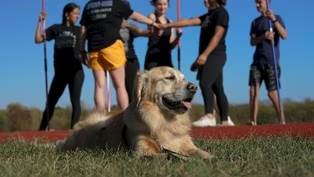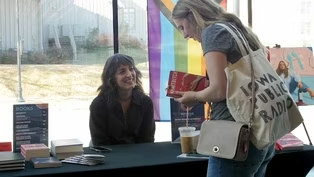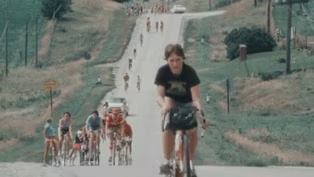
Iowa’s Specialty Egg Producers
Clip: Season 2 Episode 208 | 6m 38sVideo has Closed Captions
Meet the Bontrager family and learn about egg production on a small family farm.
Meet the Bontrager family and learn about egg production on a small family farm.
Problems playing video? | Closed Captioning Feedback
Problems playing video? | Closed Captioning Feedback
Iowa Life is a local public television program presented by Iowa PBS

Iowa’s Specialty Egg Producers
Clip: Season 2 Episode 208 | 6m 38sVideo has Closed Captions
Meet the Bontrager family and learn about egg production on a small family farm.
Problems playing video? | Closed Captioning Feedback
How to Watch Iowa Life
Iowa Life is available to stream on pbs.org and the free PBS App, available on iPhone, Apple TV, Android TV, Android smartphones, Amazon Fire TV, Amazon Fire Tablet, Roku, Samsung Smart TV, and Vizio.
Providing Support for PBS.org
Learn Moreabout PBS online sponsorship♪♪ ♪♪ In Iowa, we're really good at producing food.
♪♪ We produce a lot of pork, a lot of grain.
♪♪ [Ryan Miller] We're the number one egg-producing state by far.
We obviously don't have a giant population.
As a state, we're exporting food all over the country and all over the world.
But we're doing it on small family farms.
The birds can go outside.
We feel like we're doing it the way the consumer is thinking about how their eggs are produced and how they want their eggs produced.
And the interest in the organic or more natural foods, we can produce them here in Iowa.
♪♪ [Ryan Miller] Our producers are 60% Amish and the rest are Mennonite.
♪♪ [Ryan Miller] A lot of our farms are right close by.
♪♪ [Ryan Bontrager] I am a farmer and that's what I do for a living.
I do chickens, gather eggs, crop farming, organic crop farming here north of Kalona with my family and enjoy every minute of it.
♪♪ [Ryan Bontrager] I live here with my wife, Lisa and our oldest son Weston and our daughter Tanisha and Tiffany, Karen and our youngest son is Merle.
♪♪ [Ryan Bontrager] New Order Amish, we wouldn't have vehicles.
Mennonites would have vehicles.
We would drive horse and buggy.
We wouldn't have all the technology some of the others would have.
We would do more physical work, lots of hard work, labor.
♪♪ [Ryan Miller] We only produce specialty eggs here.
♪♪ ♪♪ [Ryan Miller] Specialty eggs are non-caged birds, cage free, organic and pasture-raised all fit into that specialty spectrum.
With a large concentration of farms right here, it takes a lot of market to utilize all of those eggs.
In order to sell all of the eggs, we have to market the eggs all across the country.
It's way more of an egg flow than like an individual farmer could sell directly.
You generally need one chicken per person.
So, like one of our farmers can service more than all of the people who live in Kalona if every person in Kalona bought eggs only at that farm.
And we have 30 some farms here.
♪♪ [Ryan Miller] Farmers want to be able to farm and produce the products.
They don't have the time and the resources to do all of the sales and marketing that it requires.
♪♪ [Ryan Bontrager] My children help us on the farm here, daily chores, gathering eggs.
♪♪ [Ryan Bontrager] Our regular day would be wake up at five o'clock in the morning and usually we eat breakfast together and then we'll go to the chicken house.
♪♪ You can carry the bucket.
♪♪ [Ryan Bontrager] Ours are organic, free range and so they would get out into pasture and I like that for myself.
I like to see the chickens out in the green grass.
I just think it's better for the chicken.
Usually I have two of my children, as the belt goes and the eggs come in through, I'll have two of the children there picking out the bad ones that we don't want to send to Farmer's Hen House.
I'll stack it on the pallet and they'll help me gather then as we go.
♪♪ [Ryan Bontrager] They're children.
Sometimes -- most times they're in it, but you know how children are.
They've got to have fun too.
So, once in a while they need some coaching.
But they do good.
(chickens clucking) [Ryan Bontrager] We have 16,000 chickens, produce around 15,000 eggs a day.
(chickens clucking) [Ryan Miller] In the same footprint that we put let's say 20,000 hens, if you have cages you could fit 100,000 hens in that exact same building footprint.
We feel like that's a big difference in how the birds are taken care of.
The scale at which you need to do cage production just would not work for our farmers.
They couldn't produce at that scale.
That's the other reason we do organic and free range and pasture-raised is it's a market that our farmers can participate in.
♪♪ [Ryan Miller] For a lot of our farmers, even if they were grading their own eggs, the kind of equipment we need requires a lot of technology, a lot of electricity, it's expensive.
♪♪ [Ryan Bontrager] You know, there's days I wake up and I wonder, if I wouldn't have a place to sell my eggs, how would I support my family?
♪♪ [Ryan Bontrager] I have a good relationship with Farmer's Hen House and I really appreciate them giving us small farmers the opportunity to have our own chickens here at home where we can be here with the family and they do really good in serving the community in that way.
♪♪
Video has Closed Captions
Clip: S2 Ep208 | 5m 50s | Hearing dogs are trained to alert the deaf and hard of hearing to sounds that are important. (5m 50s)
Video has Closed Captions
Clip: S2 Ep208 | 6m 25s | Rachel Yoder is an author and assistant professor at the University of Iowa. (6m 25s)
Video has Closed Captions
Clip: S2 Ep208 | 4m 29s | Reach back into the Iowa PBS Archives to join RAGBRAI founders John Karras and Donald Kaul in 1976. (4m 29s)
Providing Support for PBS.org
Learn Moreabout PBS online sponsorshipSupport for PBS provided by:
Iowa Life is a local public television program presented by Iowa PBS
















